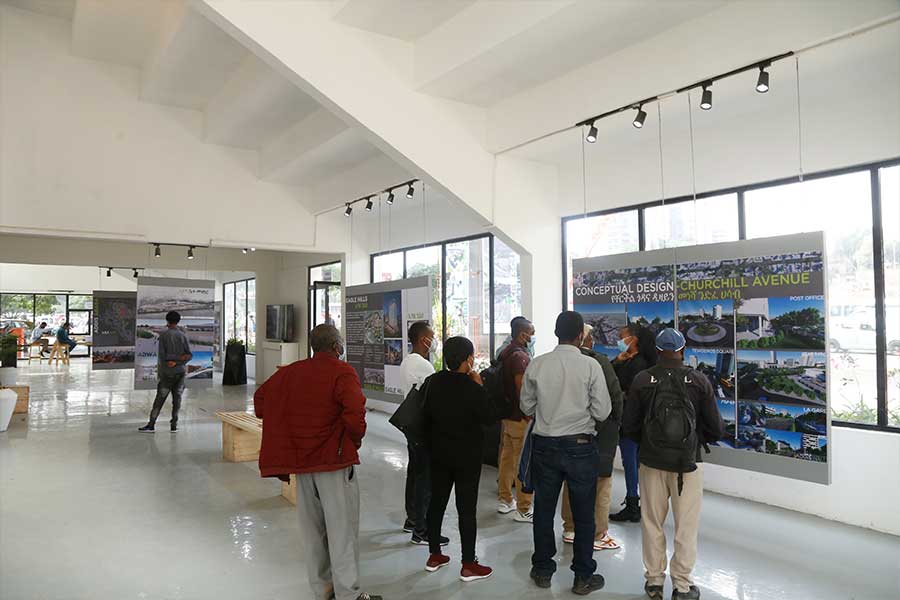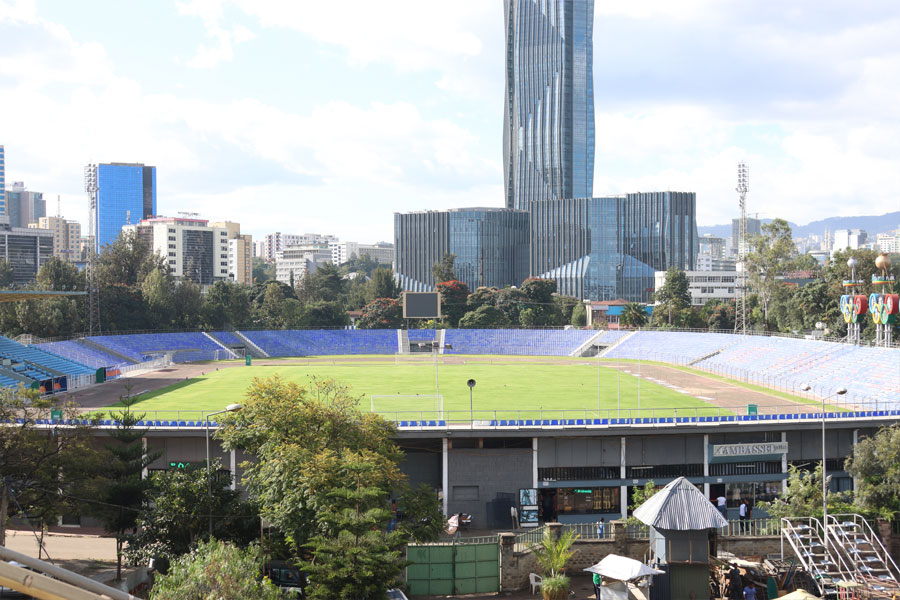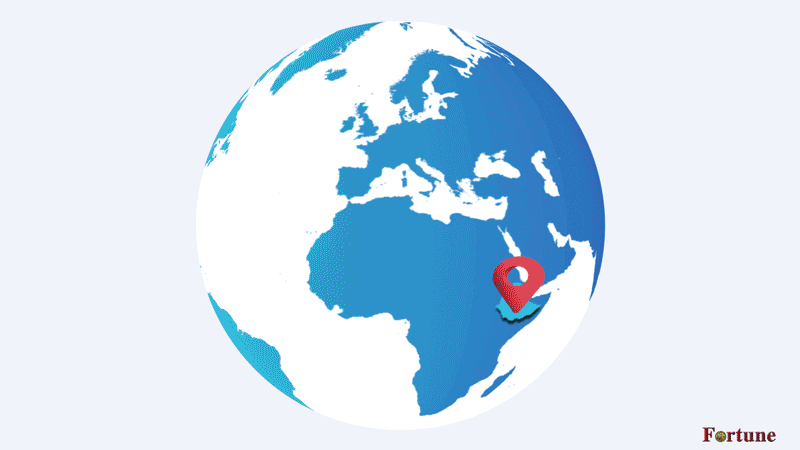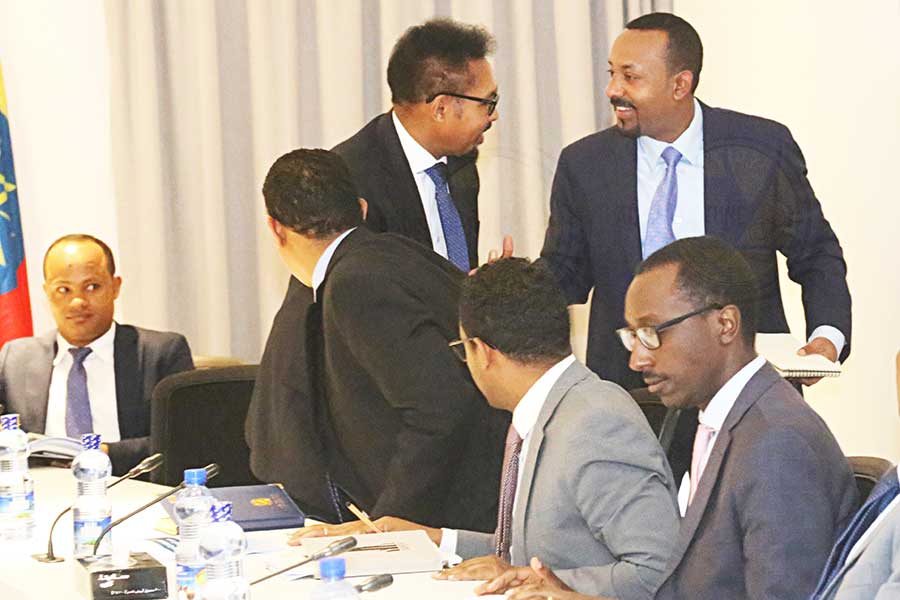
Commentaries | Nov 26,2022
Last week marked the second time that Prime Minister Abiy Ahmed (PhD) faced question time from members of the media since his rise to political power. In a few days, the week will usher in the end of his first year in office, a time that was anything but dull.
Members of the media accredited to the Prime Minister’s Office were shuffled on Thursday into a small, if not stifling, conference room where the inhibiting gaze of the Prime Minister’s security detail was on them. They met him seven months after his first press conference, during which time Abiy has taken the nation through a breathtaking journey consequential to many.
Speaking for close to two hours, the Prime Minister addressed several issues but was preoccupied with controversies concerning the status of Addis Abeba and the absence of law and order in many parts of the country, as well as the straining interparty relationship among members of the ruling coalition. Abiy took credit for what he believed are accomplishments on the diplomatic front and no less success in “arresting economic recession”.
Agreeably, Abiy’s first year has been consequential in many aspects ever since he pledged to make political reforms when he was sworn in before parliament on April 2, 2018. True to his promise, he took bold measures in opening up the political space, earning acclaim near and far.
His administration pursued the policy of freeing dissidents from jail, including prominent personalities such as Andargachew Tsegie, Eskinder Nega, Bekele Gerba, Andualem Aragie and Merera Gudina (Prof). He pushed parliament to lift a state of emergency and delist political parties in exile from being considered terrorist groups, eventually seeing them return home. Insurgencies such as Ginbot 7, the OLF and the ONLF have returned and joined close to 107 parties in signing a party code of conduct.
Abiy’s administration took initiative in forming a legal reform advisory council where laws blamed for constraining the political space were reviewed. An amended law on civil society organisations has already passed the floor of parliament, while laws on media and fighting terrorism remain in the legislative grill.
The Prime Minister’s decision in bringing gender parity after filling half of his cabinet with women was hailed as a beacon of equality across the world. Equally, his diplomatic overture in mending the “no-war and no-peace” deadlock with Eritrea tempted many Ethiopians to collect petitions to nominate him for the Noble Peace Prize.
Indeed, Abiy’s unprecedented popularity peaked when meeting a massive crowd inside the Millennium Hall during a historic visit by Eritrea’s President, Issayas Afeworqi, in July 2018. A month earlier, hundreds of thousands of his supporters rallied behind him in Mesqel Square, where an attempt on his life was foiled, ending the rally abruptly.
It was a solemn moment indicating the challenge his administration was to face in running a highly divided and polarised nation. Holding the centre and ensuring law and order remains to date one of his daunting tasks.
During last week’s press briefing, however, the Prime Minister defended his administration’s record in keeping the country at peace, disclosing the arrest of thousands of suspects allegedly involved in violence in Hawassa, Burayu, Shashemane, Gedio, Benishangul and Addis Abeba. He cited the containment of what he said was “a major crisis” in Somali Regional State where there was a 30,000-member armed militia. The region’s president at the time, Abdi (Illey) Mohamed Omar, has been arrested and charged with gross human rights violations.
The administration’s Achilles Heal remains on the macro-economic front, although Abiy characterised it last week as a front for success. An economy exposed to growing external debt and suffering from a painful forex crunch, Abiy told the media the worst was behind. Despite strong austerity measures mainly criticised by experts as untimely, he claimed the economy is now out of the swamp.
As the backdrop for such mega moves in the political and economic fronts, there have been a couple of projects showing the passion the Prime Minister has for symbolic significance. Sourced from off-budget expenditures, renovating the Prime Minister’s Office, restoring the Menelik Palace and rehabilitating rivers and their banks across Addis Abeba were the most visible. Before the press briefing began, members of the media were given a tour of the palace in an attempt to dazzle them on the quality of the restoration work.
One of the landmarks given a significant facelift is a dining hall built a century ago during the reign of Emperor Menelik. It is now expected to host a fundraising gala dinner, dubbed ‘Dine for Sheger,’ where close to 1,000 people are expected to attend in mid-May. They will have to pay five million Birr for a plate, helping the Prime Minister raise five billion Birr to finance the riverside development work.
The Prime Minister is planning to host the dinner in Emperor Menelik’s ‘Enqulala Bet,’ literally translated as egg house, where royal feasts were once held, attended by the nobility, dignitaries, officials and members of the public. It has a capacity of hosting up to 3,000 guests and will be open for public events in the future.
“The first event the hall will host is the fundraising dinner,” Abiy told the media. “This project has energised me, as it is moving fast with very good project management.”
Construction work has been in high gear over the past couple of months, and the 40,000Sqm palace has been undergoing a massive renovation with an investment of over two billion Birr. Its progress has reached 70pc, with a plan to finalise it early next Ethiopian year, according to people familiar with the project. When completed, it is expected to incorporate a zoo, a children’s playground, a museum, cultural villages and a public reading area.
Much of the money raised from the dinner is planned to be used to revitalise and develop banks and riversides on two rivers in Addis Abeba. They run from Mount Entoto to the plains of Akaki and the reservoir of Aba Samuel, where a new wastewater treatment plant is to be located.
With a target of making the city a metropolitan centre, the primary aim of the project - estimated to cost 29 billion Br and take three years to complete - is to clean the river bed and riverbanks. It incorporates the installations of water treatment plants, tunnel developments and stormwater facilities. It will also include roads, playgrounds, sports fields, shops, bicycle paths, walkways and entertainment sections.
As a pilot project, the City Administration has kicked off a one-kilometre development of the area that extends from Basha Wolde Chilot to Orma Garage near the Sheraton Addis Hotel. A well-established construction firm behind the building of several landmarks in Addis Abeba including the National Bank of Ethiopia, Geom Luigi Varnero was awarded the project two months ago, winning the bid for 2.5 billion Br.
Varnero, which has already completed clearing 49ha of land in the area, was awarded the project after being selected in a restrictive bid against four other Chinese companies. It placed an offer that was 1.4 billion Br lower than the second-lowest bidder. Although it has received a letter of acceptance and was told to start work immediately after Deputy Mayor Takele Uma laid a cornerstone, Varnero has yet to sign a contract agreement with the River Basins & Green Areas Agency of the City Administration overseeing the project.
However, Prime Minister Abiy has disclosed to the media that China has shown interest in financing 12.5Km of the full project, including the area awarded to Varnero. He also said the agreement with the Chinese company would be signed soon.
“The Chinese have agreed to provide us with the initial concept, design and financing for the project,” Abiy said. “The project will be started in four weeks and be completed next year in June.”
Like many things about the modus operandi of his administration, several people within and outside of the government keenly following the progress of the project were dumbfounded in hearing him say that. Meskerem Tamru, president of the Association of Ethiopian Architects, is a professional advising the Deputy Mayor on the technical matters. She was not aware of the development with the Chinese, and her team was informed of the decision to sign the project over to the Chinese from the media.
“We don’t know about the deal with the Chinese,” Meskerem told Fortune. “Varnero is undertaking the project.”
Representatives from Varnero were not available for comment.
These projects may serve the Prime Minister as a needed break from what is expected of him concerning the state of affairs of the nation. Lencho Letta, a veteran politician since the 1960s, believes Abiy needs to put his focus on three issues: restoring law and order; reviewing legislation and reforming democratic institutions, and holding national elections.
“Bigger issues with structural ramifications will have to be dealt with after the elections,” Lencho told the Amharic weekly, Bole Times.
Nonetheless, the ambiguity in the handling of those involved in the rehabilitation project and the unpredictability and uncertainty it created, appears to be the hallmarks of Prime Minister Abiy’s administration in many areas over the past year.
PUBLISHED ON
Mar 30,2019 [ VOL
19 , NO
987]

Commentaries | Nov 26,2022

Radar | Jan 21,2023

Radar | Jun 27,2020

Agenda | Oct 27,2024

Covid-19 | Apr 08,2020

Fortune News | Jul 13,2020

Radar | May 04,2024

Fortune News | Jul 27,2019

Radar | Mar 25,2023

Radar | Nov 14,2020

Dec 22 , 2024 . By TIZITA SHEWAFERAW
Charged with transforming colossal state-owned enterprises into modern and competitiv...

Aug 18 , 2024 . By AKSAH ITALO
Although predictable Yonas Zerihun's job in the ride-hailing service is not immune to...

Jul 28 , 2024 . By TIZITA SHEWAFERAW
Unhabitual, perhaps too many, Samuel Gebreyohannes, 38, used to occasionally enjoy a couple of beers at breakfast. However, he recently swit...

Jul 13 , 2024 . By AKSAH ITALO
Investors who rely on tractors, trucks, and field vehicles for commuting, transporting commodities, and f...

Jul 12 , 2025
Political leaders and their policy advisors often promise great leaps forward, yet th...

Jul 5 , 2025
Six years ago, Ethiopia was the darling of international liberal commentators. A year...

Jun 28 , 2025
Meseret Damtie, the assertive auditor general, has never been shy about naming names...

Jun 21 , 2025
A well-worn adage says, “Budget is not destiny, but it is direction.” Examining t...